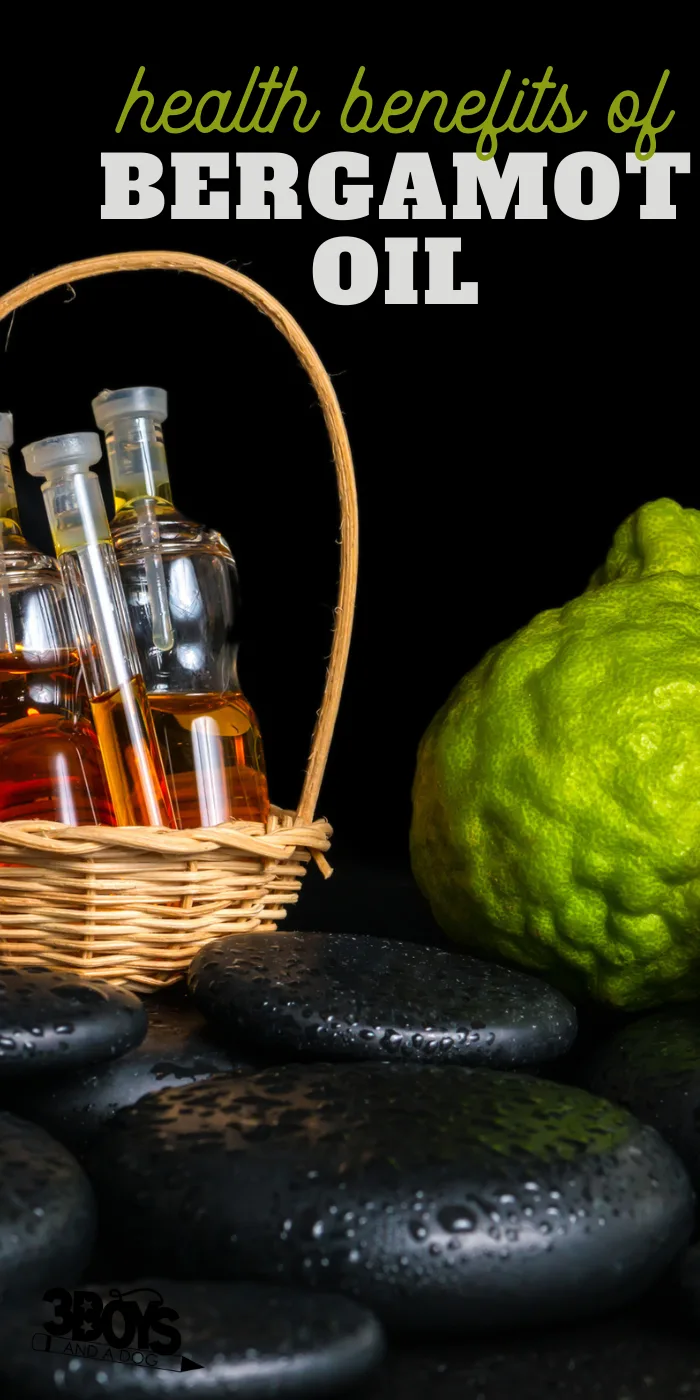When it comes to the benefits of Bergamot Essential Oil, there are a lot of good reasons to use this type of essential oil. Many people like the scent of Bergamot and that tends to be one of the biggest draws to it at first.
The essential oils of Bergamot extracted from the bergamot orange peel have a light citrus fragrance and floral notes, which are said to have a curative effect.
I think that it has a really nice and light fragrance and I really like the citrus scent. Just one drop of essential oil produces such a great scent!

If you’re ready to learn all about one of my favorite essential oil products, you’re going to love all this great information below!
If you’re wondering where it’s found, Bergamot oil is commonly used in aromatherapy to raise humor, relieve stress, and possess characteristics similar to grapefruit, essential oil, because it is antiseptic, antispasmodic and analgesic (pain reliever). It can also have high cholesterol usefulness as well.
Some experts add drops of bergamot to water, while others suggest the use of bergamot oil topically or orally. It should be noted, however, that bergamot oil is known to cause side effects and interactions, especially when used excessively.
In both men’s and women’s personal care products, the characteristic, citrus fragrance of Bergamot is used. It is available in perfumes, cologne, cleaning products, and cosmetics. Bergamot is edible as a flavoring food and beverage oil. It has medicinal importance as well.
Affiliate links are used in this post. This means that if you click through a link to purchase a product, I’ll get a commission based on your purchase, at no extra cost to you.
Benefits of Bergamot Essential Oil
As I mentioned earlier, there are a lot of great benefits that come with using this oil for skin care and other methods.
Aromatherapy practitioners claim that inhaling or rubbing essential oils to the skin sends messages to the limbic system, the part of the brain that manages emotions and memories.
This can lead to a drop in blood pressure, heart rate, and breath, and an increased “feel-good” hormone serotonin and neurotransmitter dopamine.
, derived from the peel of the bergamot orange, is a potent essential oil that has been used in traditional and alternative medicine for centuries due to its wide array of potential health benefits. It is characterized by its citrusy scent with floral undertones, making it a popular choice in aromatherapy.
One of the key applications of bergamot oil is as a nasal decongestant. When inhaled, it can help clear the nasal passages and ease respiratory discomfort. Its antiseptic properties also make it useful as an antibacterial agent when applied to the skin, potentially helping to prevent the growth of harmful bacteria.
In the realm of alternative medicine, bergamot oil is believed to address a range of medical conditions, although the scientific evidence supporting these claims varies.
For instance, it has been used topically to treat skin irritation problems and acne. The oil’s antibacterial properties may help combat the bacteria responsible for acne, while its anti-inflammatory qualities can soothe redness and sensitive skin.
For hair improvement, bergamot citrus oils is often added to shampoos or conditioners. It is thought to stimulate blood circulation in the scalp, promoting hair growth and contributing to healthier, more vibrant hair.
Some people use bergamot oil to alleviate symptoms of depression. In aromatherapy, the oil’s uplifting, citrus fruit, fragrance is believed to boost mood and promote feelings of joy and energy. However, more research is needed to fully understand the potential mental health benefits of bergamot oil.
Bergamot oil has also been used as a natural remedy for food poisoning due to its antibacterial properties. It may help kill bacteria that cause foodborne illnesses, although it should never replace proper medical treatment.
Insomnia sufferers may find relief through the use of bergamot oil. Its calming scent can help induce relaxation and improve sleep quality. Some studies suggest that inhaling bergamot oil can reduce cortisol levels, a hormone that can interfere with sleep.
The oil is also used to manage high cholesterol levels. Some research indicates that bergamot oil can inhibit an enzyme linked to the production of cholesterol in the liver.
Joint pain and headaches are other conditions that may be alleviated by bergamot oil. Its anti-inflammatory and analgesic properties can help reduce pain and inflammation.
While there is typically limited scientific evidence to support these uses, some small clinical trials have shown promising results. It’s important to remember that while bergamot oil may help ease certain symptoms, it should not replace conventional treatments or be used without first consulting a healthcare professional.
Anxiety and Stress
A small study conducted in 2015 Trusted Source on women across Japan found that bergamot oil inhaled by water vapor decreased anxiety and fatigue.
Likewise, a 2013 article in Current Drug Targets stated that bergamot aromatherapy (among other essential oils) would reduce deprivation, anxiety, and other mood problems by signaling dopamine and serotonin to the brain.
Infection
Bergamot oil is well known for its antibacterial and antifungal efficacy, with some advocates who treat not only skin disorders but also mouth and digestive tract infections. Such arguments are backed by little evidence.
A research from the Open Food Source Journal in 2019 showed that bergamot oil is capable of neutralizing Staphylococcus aureus at concentrations of 27 micrograms per milliliter (μg/mL) at all levels from simple to life-threatening sepsis.
Bergamot oil is potentially healthy and possible to avoid minor skin infections at this concentration.
High Cholesterol
An analysis of studies in 2019 concluded that some of the compounds known as brutieridin or melitidin in bergamot oranges (also known as citrus bergamia) have a potent cholesterol-reduction effect.
“These flavonoids have been shown to decrease total cholesterol and “defective” LDL cholesterol when taken through the mouth in various studies ranging from 30 days to 12 weeks.
Interestingly, it can be more effective because of the higher concentrations of brutieridine and melitidine than bergamot oil.
Inflammation and Pain
Compounds present in bergamot oils include linalool and carvacrol. A 2017 Source study examined the impact on pain response and other symptoms in humans and animals of several oil essential compounds.
Linalool and carvacrol were both found to have analgesic, anticonvulsant and anti-inflammatory properties when used in a number of skin-applied methods.
The analysis also showed that further study is needed of the toxicological potential effects of essential oils on humans.

Possible Side Effects
When it comes to topical use, it’s crucial to exercise caution due to its highly concentrated nature.
Bergamot essential oil should never be applied directly to the skin at full strength. Doing so can trigger a range of adverse reactions, including severe skin inflammation, stinging, and light sensitivity. These effects are not just uncomfortable, but they can also exacerbate existing skin conditions or create new ones on healthy skin.
For instance, people with sensitive skin or underlying skin disorders may experience heightened irritation or an allergic reaction upon the undiluted application of bergamot oil.
Furthermore, bergamot oil contains a phototoxic compound called bergapten. When applied to the skin and then exposed to ultraviolet rays, this compound can cause a severe skin disorder known as photodermatitis.
Symptoms can include redness, itching, and blistering. This is why it’s especially vital to avoid sun exposure after topical application of bergamot oil.
To safely use bergamot oil on the skin, it should first be diluted with a carrier oil. Carrier oils are neutral oils that can safely be used on the skin without causing irritation.
Examples of carrier oils include coconut oil, sweet almond oil, and jojoba oil. These oils not only dilute the bergamot oil, making it safer for skin application, but they also aid in the absorption of the oil into the skin.
When mixing bergamot oil with a carrier oil for topical use, a general rule of thumb is to maintain a concentration of no more than 2-3%. This equates to about 12-18 drops of bergamot oil per ounce of carrier oil. Always perform a patch test before applying the mixture to a larger skin area to ensure no adverse reaction occurs.
In conclusion, while bergamot oil can potentially offer numerous benefits for various skin conditions, it’s essential to use it correctly and cautiously to avoid any adverse effects.
As with any natural remedy, it’s always best to consult a healthcare professional before incorporating bergamot oil into your skincare routine.
Helpful Tip
If an essential oil accidentally freezes, let it come to room temperature gradually. Do not try to heat it. Essential oils are flammable and have different flashes at which they can ignite.
Even though essential oils have a long shelf life, you should discard any that have become cloudy, smell funny, or have thickened consistency. Always keep the cap screwed on tightly to prevent oxidation and evaporation.
Now that you know all the benefits and risks associated with using Bergamont Oil, it’s time to decide if you’ll be using it or not. Read the pros and cons and decide if you’re ready to give it a try!
What is the phototoxic effect?
Phototoxicity, or the phototoxic effect, refers to a chemical reaction that makes skin unusually sensitive to sunlight. It occurs when certain compounds, present in some substances like bergamot oil, react when exposed to ultraviolet (UV) light, causing skin inflammation, redness, and sometimes blistering, similar to an intense sunburn.
Bergamot oil, extracted from the peel of the bergamot orange, is known to be one of the most phototoxic essential oils. Over 90% of the whole oil can cause this phototoxic reaction.
This is due to the presence of furanocoumarins, a class of organic chemical compounds, including psoralene and methoxsalen, that absorb UV light and can cause damage to the skin when activated by sunlight.
The severity of the phototoxic effects can significantly vary based on the source and processing of the bergamot oil as well as the skin tone of the user.
It’s important to note that not all furanocoumarins present in essential oils are phototoxic, but those in bergamot oil are known to cause photosensitivity.
However, there are different formulations of bergamot oil available that have the bergaptene (a type of furanocoumarin) removed, such as Bergamot FCF (Furanocoumarin Free) and steam-distilled bergamot, which are not considered phototoxic.
To ensure safe use, it’s recommended to avoid sun exposure for at least 12 to 24 hours after applying bergamot oil to the skin. If sun exposure can’t be avoided, using a high SPF sunscreen and covering the area where the oil was applied can help protect the skin.
Bergamot Oil FAQs
1. Can I ingest Bergamot Oil?Ingesting bergamot oil is generally not recommended without the supervision of a healthcare professional. While it’s used as a flavoring in foods and beverages, therapeutic use often involves inhalation or topical application.
2. How does Bergamot Oil work in aromatherapy? In aromatherapy, bergamot oil is one of the most popular essential oils. Put a drop or up to 6 in a cup of warm water to really understand why it is used for its mood-enhancing effects.
When inhaled, the aromatic compounds in the oil can stimulate areas of your brain that are involved in emotions, behavior, and memory, potentially helping to reduce stress, anxiety, mood disorders, and depression.
3. Can Bergamot Oil help with hair health? Yes, bergamot oil is often used in hair care products for its potential benefits. It’s believed to stimulate blood circulation in the scalp, which can promote hair growth and improve overall hair health. However, just like with skin application, it should be diluted with carrier oils before being applied to the hair.
4. Does Bergamot Oil interact with any medications? Bergamot oil may interact with certain medications, especially those that are sensitive to sunlight such as certain antibiotics and antipsychotics. This is due to a compound in bergamot oil called bergapten, which can make your skin more prone to sunburn or rashes. It’s always best to consult with a healthcare professional before using bergamot oil if you’re taking any medication.
5. Can Bergamot Oil help with sleep disorders? Some people use bergamot oil in aromatherapy to help manage sleep disorders like insomnia. The calming scent of bergamot oil can help induce relaxation and improve sleep quality. However, more scientific research is needed to fully understand its potential benefits in its aromatic use.
More Essential Oil Resources
- Simple and Affordable Essential Oils for Problem Skin
- Best Carrier Oils to Dilute Essential Oils
- How to Blend Essential Oils
- Essential oil for muscle pain recipe

A tad bit about Rocky Mountain Oils:
Safe and Healthy – RMO provides GC/MS (Gas Chromatography / Mass Spectrometry) test results from a verified third-party, independent lab for each one of their essential oil products. In fact, on the bottom of your bottle is a batch number. You can go to their site and enter your number. This will give you the results of your bottle’s testing!
Shipping – All orders within the United States qualify for free economy shipping. Orders have an estimated delivery time of 2-7 business days! They even have a neat little chart to help you estimate your shipping time if choosing the free shipping option.
Return Policy – Products can be returned for any reason, even if opened, for up to 90 days. Yes, seriously! They even send you a shipping label so you don’t have to pay to return the product. No more worries about “what if it doesn’t work or I am allergic” simply return it!



